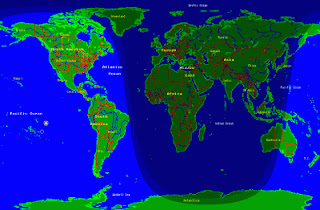Product: Weekly Highlights and Forecasts
:Issued: 2013 Sep 02 0622 UTC
# Prepared by the US Dept. of Commerce, NOAA, Space Weather Prediction Center
# Product description and SWPC web contact www.swpc.noaa.gov/weekly.html
#
# Weekly Highlights and Forecasts
#
Highlights of Solar and Geomagnetic Activity 26 August - 01 September 2013
Solar activity was at very low to low levels. The period began at very low levels and continued until 28 August. By 29 August, low levels were reached with an isolated C1 flare from Region 1836 (N11, L=339, class/area Cao/180 on 30 August) at 29/0434 UTC. Also on 29 August was a 44 degree filament eruption centered near S40E00 that produced a coronal mass ejection (CME) first seen in SOHO/LASCO C2 imagery at approximately 29/0600 UTC. The ejecta was directed south of the ecliptic plane and was determined to not be geoeffective. On 30 August, a long duration C8/1f flare was observed from Region 1836 at 30/0246 UTC. Associated with this flare were Type II (1318 km/s) and Type IV radio sweeps as well as a partially Earth-directed CME (estimated speed of 1071 km/s). By 31 August through 01 September,only low level C-class flaring was observed.
No proton events were observed at geosynchronous orbit.
The greater than 2 MeV electron flux at geosynchronous orbit was at high levels on 26-27 August due to activity associated with a geoeffective coronal hole high speed stream (CH HSS). Normal to moderate levels were observed for the rest of the period.
Geomagnetic field activity was at quiet to minor storm levels. Quiet levels were observed until mid-day on 27 August. At approximately 0700 on 27 August, solar wind speed, density and total field measurements began to rise. The Bz component of the went southward to a maximum of -13 nT while wind speed slowly increased to a maximum of 512 km/s by early on 28 August. A solar sector boundary crossing was observed at approximately 27/1816 UTC. The geomagnetic field responded with unsettled to minor storm levels that continued through early on 28 August. By 0800 on 28 August, the total field was diminished to around 4 nT while the solar wind was in decline. Quiet levels were observed once again through late on 30 August, when a positive polarity CH HSS moved into geoeffective position.
Solar wind speeds increased to near 430 km/s while the total field increased to around 9 nT. Total field slowly declined to near 5 nT by late on 31 August, however wind speeds briefly increased at approximately 01/0630 UTC to near 580 km/s before ending the period around 450 km/s. Active periods were observed late on 30 August through early on 31 August, but diminished to quiet to unsettled periods for the remainder of the period. The August 30 CME appeared to have a weak impact early on 02 September; however no significant geomagnetic effects were observed at the time of this report.
Forecast of Solar and Geomagnetic Activity 02 September - 28 September 2013
Solar activity is expected to be at very low to low levels. A chance for an M-class flare exists with the return of old Region 1817 (S21, L=241) from 02-15 September.
No proton events are expected at geosynchronous orbit.
The greater than 2 MeV electron flux at geosynchronous orbit is expected to be at normal to moderate levels with high levels expected on 04-07 September, 12-16 September, 19-23 September, and again on 27-28 September due to activity associated with CH HSSs.
Geomagnetic field activity is expected to be at quiet to active levels on 02 September associated with activity from the 30 August CME. Unsettled to active conditions are expected on 04 September, 10-14 September, 17-19 September, 26-28 September due to CH HSS activity. Quiet to unsettled periods are expected on 23-24 September due to a solar sector boundary crossing.
Product: 27-day Space Weather Outlook Table 27DO.txt
:Issued: 2013 Sep 02 0622 UTC
# Prepared by the US Dept. of Commerce, NOAA, Space Weather Prediction Center
# Product description and SWPC web contact www.swpc.noaa.gov/wwire.html
#
# 27-day Space Weather Outlook Table
# Issued 2013-09-02
#
# UTC Radio Flux Planetary Largest
# Date 10.7 cm A Index Kp Index
2013 Sep 02 105 15 4
2013 Sep 03 108 5 2
2013 Sep 04 110 8 3
2013 Sep 05 112 5 2
2013 Sep 06 112 5 2
2013 Sep 07 115 5 2
2013 Sep 08 115 5 2
2013 Sep 09 110 5 2
2013 Sep 10 110 10 3
2013 Sep 11 115 15 4
2013 Sep 12 120 18 4
2013 Sep 13 120 8 3
2013 Sep 14 120 8 3
2013 Sep 15 120 5 2
2013 Sep 16 115 5 2
2013 Sep 17 115 12 4
2013 Sep 18 110 18 4
2013 Sep 19 105 15 4
2013 Sep 20 105 5 2
2013 Sep 21 110 5 2
2013 Sep 22 110 5 2
2013 Sep 23 105 8 3
2013 Sep 24 105 8 3
2013 Sep 25 100 5 2
2013 Sep 26 100 8 3
2013 Sep 27 100 10 3
2013 Sep 28 100 8 3
(NOAA)
